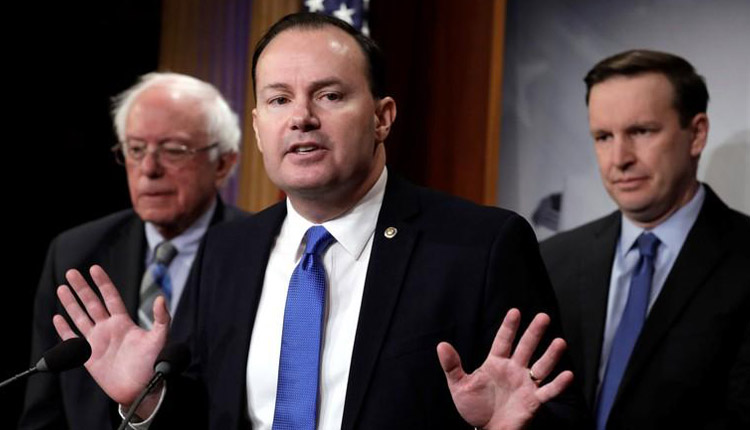U.S. lawmakers said they expect Congress will pass a resolution ending U.S. involvement in the Yemen war, which would force President Donald Trump to issue the first veto of his presidency in order to continue supporting the Saudi-led coalition.
Republican and Democratic senators and representatives said on Wednesday they were re-introducing a war powers resolution that passed the Senate by 56-41 in December, a rebuke of Trump amid anger at Saudi Arabia not just over civilian deaths in Yemen, but also the killing of Saudi journalist Jamal Khashoggi at a Saudi consulate in Turkey.
The lawmakers – an alliance of progressive Democrats and Republican constitutional conservatives – deplored the “humanitarian disaster” in Yemen but also said they wanted Congress to reassert its constitutional authority to decide whether the United States should be involved in military conflict.
“That decision has never been debated and discussed and voted on and approved by Congress,” Republican Senator Mike Lee, one of the measure’s sponsors, told a news conference.
The United States has supported the Saudi-led air campaign against Iran-backed Houthi rebels in Yemen with mid-air refueling support, intelligence and targeting assistance.
Opponents of the resolution are reluctant to risk disrupting the strategic U.S. relationship with Saudi Arabia, seen as an essential counterweight in the Middle East to Iran, arch-enemy of close U.S. ally Israel.
The embassy of Yemen in Washington issued a statement opposing the resolution, saying it would “deliver a massive victory to Iran” if Washington were to stop supporting the coalition.
December’s Senate vote was the first time either chamber of Congress backed a resolution to withdraw U.S. forces from a military engagement under the War Powers Act. That law, passed in 1973, limits the president’s ability to commit U.S. forces to potential hostilities without congressional approval.
The measure never went further in December because the Republicans who then controlled the House of Representatives did not allow a vote in that chamber before the end of the year.
However, the measure’s sponsors insisted it had helped lead to a ceasefire in Yemen that began in December. “Sometimes we underestimate how much influence we have,” Democratic Representative Ro Khanna said.
Democrats now have a House majority, but Trump’s fellow Republicans have increased their edge in the Senate by two seats to hold a 53-47 margin.
It would take a two-thirds majority in both houses of Congress to overcome a Trump veto. Trump had threatened a veto in December. The White House did not immediately respond to a request for comment on whether he still intended to do so.
“President Trump is going to have to make a decision,” said Senator Bernie Sanders, an independent who caucuses with Democrats.
source: Reuters


